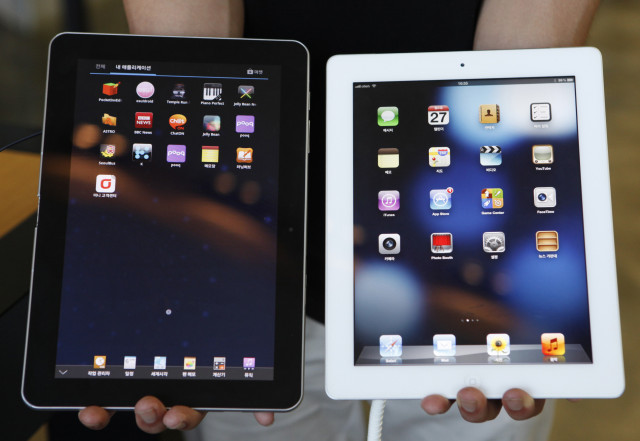With Samsung win on Galaxy Tab, judge may reconsider US ban
Judge may go back over Samsung Galaxy Tab ban in the US.

With Samsung win on Galaxy Tab, judge may reconsider US ban
The jury in the San Jose, California, federal court awarded the iPhone and iPad maker $1.05 billion in damages and said Samsung had copied critical features in the US company's products.
However, it declined to side with Apple on one patent, covering design elements on the iPad. That put the jury directly at odds with the judge in the case who, only two months earlier, had sided with Apple over allegations the Galaxy Tab 10.1 tablet ripped off Apple's design.
US District Judge Lucy Koh issued a pre-trial order barring Samsung from selling the Galaxy Tab 10.1 in the United States. [ID: nL2E8HR0DD]
Late on Sunday, Samsung asked Koh to dissolve the order, due to the jury's finding. "There is thus no proper basis for maintaining the injunction," Samsung attorneys wrote.
An Apple representative could not be reached immediately for comment.
Samsung's Galaxy touch screen tablets, powered by Google's Android operating system, are considered by some industry experts to be the main rival among larger tablets to the iPad, although they are currently a distant second in sales to Apple's device.
Normally, when a preliminary injunction based on one patent becomes inconsistent with a subsequent verdict, the party subject to the injunction asks the court to lift it, said Mark McKenna, a professor at the University of Notre Dame's Law School.
Yet while the jury absolved Samsung on allegations the Galaxy Tab violated Apple's design patent, it did say the device infringed some of Apple's software patents. That could complicate Samsung's pitch, McKenna said.
"If Samsung or Google could design around those patents, use features that didn't infringe, then they could sell the devices without violating the injunction," McKenna said.
Additionally, Koh can overrule the jury's decision and issue a verdict saying the Galaxy Tab infringed Apple's design patent.
"Judge Koh appears to be of the mindset that the accused Samsung tablet easily meets the 'substantially the same' infringement standard - so much so that the facts lead to one and only one conclusion - infringement," said Christopher Carani, a partner at Chicago-based intellectual property law firm McAndrews, Held & Malloy.
"Thus, Apple has a greater chance than usual to succeed in convincing Judge Koh to play this extraordinary trump card."
If the sales ban is ultimately dissolved, Samsung could go after Apple for damages for the wrongful imposition of the injunction, legal experts said.
Samsung, which has various tablet line-ups with different sizes from 7 inches to 10.1 inches (17.8-25.7 cm), introduced the Galaxy Tab 10.1 in June last year and recently unveiled an upgraded version, the Galaxy Tab 10.1 II.
The company said that Koh's injunction would not affect the updated Tab 10.1 II.
The case in US District Court, Northern District of California, is Apple Inc v. Samsung Electronics Co Ltd et al, 11-1846.



















COMMENTS
Comments are moderated and generally will be posted if they are on-topic and not abusive.
For more information, please see our Comments FAQ